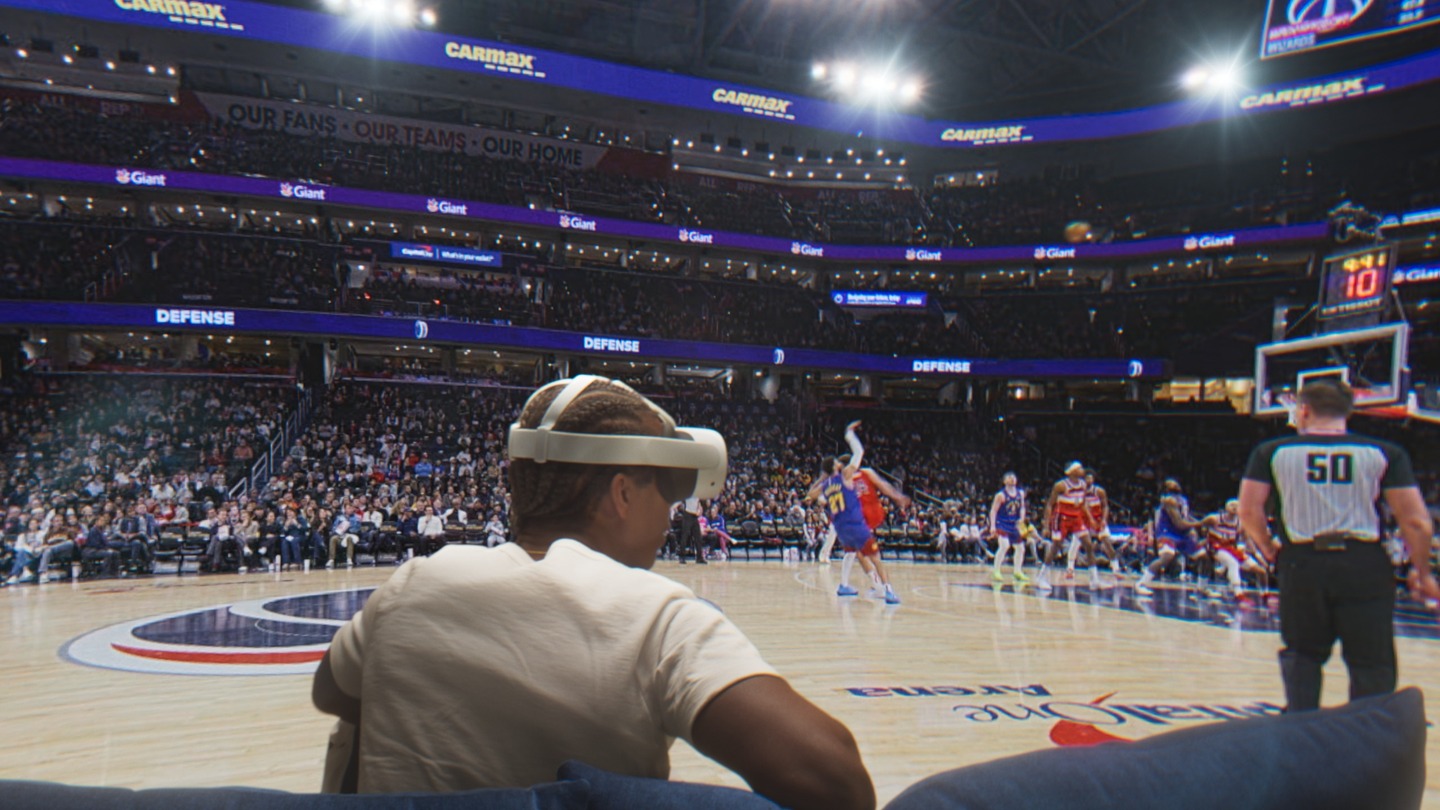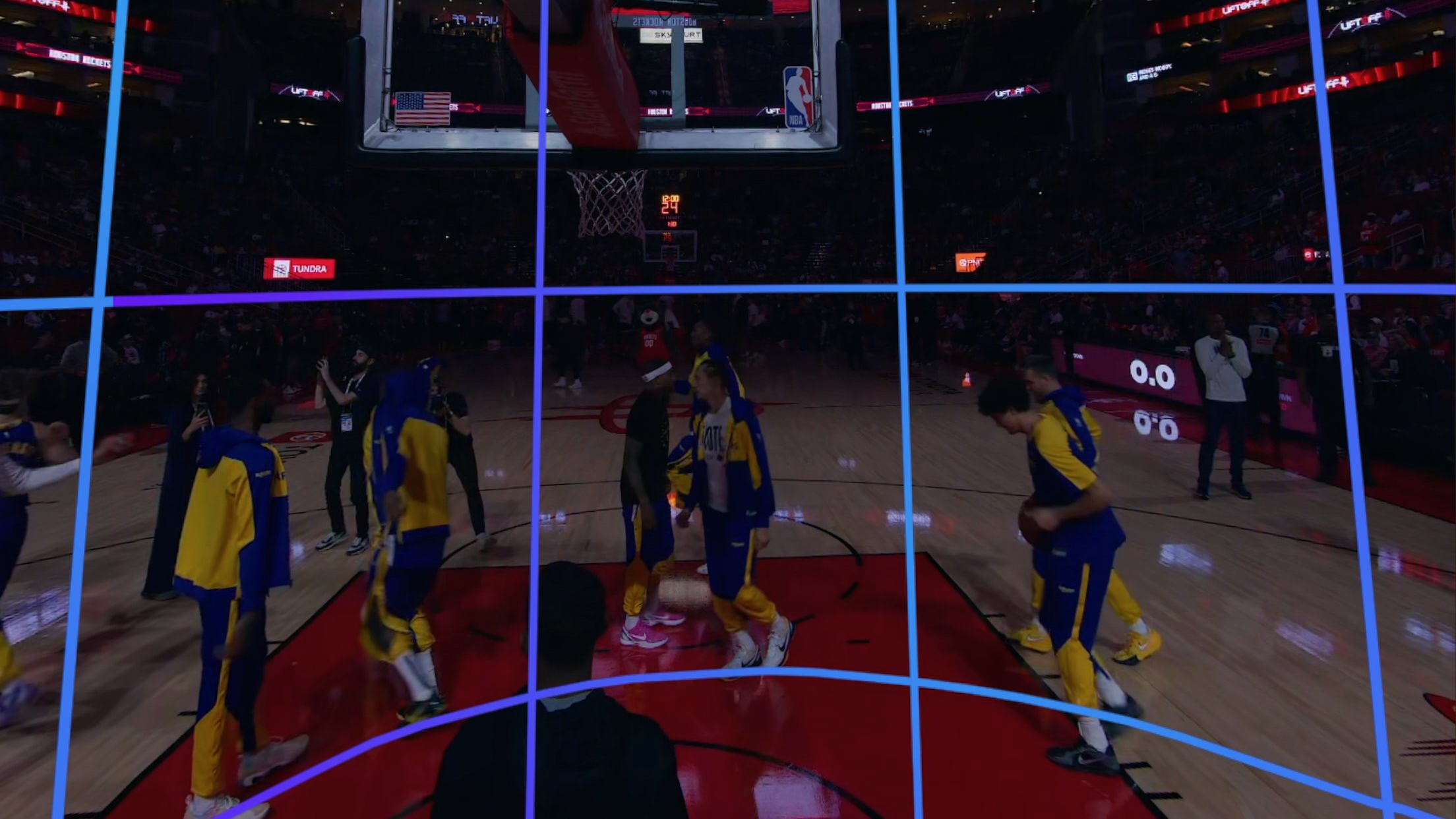
Since the early days of VR, we've heard the promise that it could challenge traditional sports-watching. Why watch the Warriors game on your flatscreen TV when you could (virtually) sit courtside and see your sports heroes up close as if you'd paid thousands to hang out with the celebs and venture capitalists?
On Saturday, I strapped on my Meta Quest 3, opened the Xtadium app, and transported myself to the Toyota Center in Houston for the Warriors-Rockets game, one of 52 basketball games streamed in VR for free for the 2025 season.
I had a blast...but I also didn't make it a full half. And not because the Warriors almost blew a 30-point lead!
Your typical TV broadcast uses an eagle-eyed view above the court, interspersed with close-ups of yelling coaches and slo-mo replays. But in VR, it's all about you "being there," so they place 360-degree cameras at center court and above each basketball hoop so you can look wherever you want, immersed in the action with the play-by-play commentary mixed with the actual sounds of the court.
At its best, NBA on Quest really does feel immersive. From the backboard cameras, you get close-up views of the players' faces and how they dance in patterns across the court to shake off pursuit, far better than you can from the usual top-down view. I wish Curry hadn't been injured for the game, but seeing my other faves splashing down 3s and bullying the Rockets on defense was fantastic.
But there's a reason why broadcasts default to a top-down view in arena sports: you need a wide, tall vantage to see the full flow of a game for fast breaks and long passes. And the default side-view camera for Xtadium broadcasts is weirdly low to the ground — probably to avoid blocking people behind it. You feel like a child staring up at giants from the floor.

There's a bigger problem: If you're close up on the action on one side and then there's a fast break, it's completely disorienting to suddenly jump to a courtside angle, then to the other hoop. There's no warning, so you jerk your neck left or right trying to re-find the dribbling player.
I missed a few highlights because of the hectic camera-warping, and I found myself watching the floating TV screen above the arena at times because it was easier to follow. That obviously defeats the whole purpose of basketball in VR!
Lastly, you have to accept that you're not at the arena; you're wearing a 1.1-pound headset for 2.5 hours, your eyes straining unless you add prescription lens inserts, and you're sitting alone. The Xtadium app lets you see your mixed-reality surroundings beside and behind you, but if you're sitting on a couch or in bed, all you're really seeing is that arena. When you're on the commercial break sitting and watching giveaways, cheerleaders, and other fan distractions without being able to talk to anyone, it's a bit lonely!
For all those reasons, I took the headset off before the half and switched to my local broadcast to give my tired eyes and twisting neck a break.
How watching NBA games in VR *should* work
IMMERSIVE NBA WEEKEND!!Friday: Bulls at Bucks.🔴🟢Saturday: Thunder at Bulls.🔵🔴Remember we also have multi-game nights with all NBA League Pass games!#NBA #IMMERSIVE #BULLS #BUCKS #THUNDER #Sports #fyp #VR pic.twitter.com/lM3mAoTCJuOctober 25, 2024
I know this goes against the usual broadcast strategy of curating what people see, but there's one obvious solution to make VR sporting events less hectic and more immersive: Give us camera control.
Let us point a controller or use hand tracking to select a back-court or side-court view at any time so we can decide which "seat" we're in at any given moment! That way, we can decide to stay in one spot (as if we really were at the game) or jump angles when we're ready for it, not when the broadcast team thinks we are.
I also think it should be easier to swap from the immersive courtside view to your mixed-reality living room at any moment, especially during commercial breaks! If you're at home watching the game, you'll want to check in on family, pets, or your phone without taking the headset fully off.
If Xtadium makes watching VR broadcasts less "traditional" and more interactive, then it would truly feel next-gen! As it is, I'll tune in again for the next Warriors game in VR — December 8 against the Timberwolves — to see Steph's antics up close, but I still don't think I'll last the whole game.
Immerse yourself
Want to dive into VR games and broadcasts without spending too much? I love my Quest 3, but it's on the expensive side; the Meta Quest 3S costs $200 less but uses the same Snapdragon XR2 Gen 2 chip, 8GB of RAM, and full-color mixed-reality cameras to keep you grounded in your living room. Aside from VR broadcasts, it has a wide array of fun VR sports games to keep you active in your living room!







